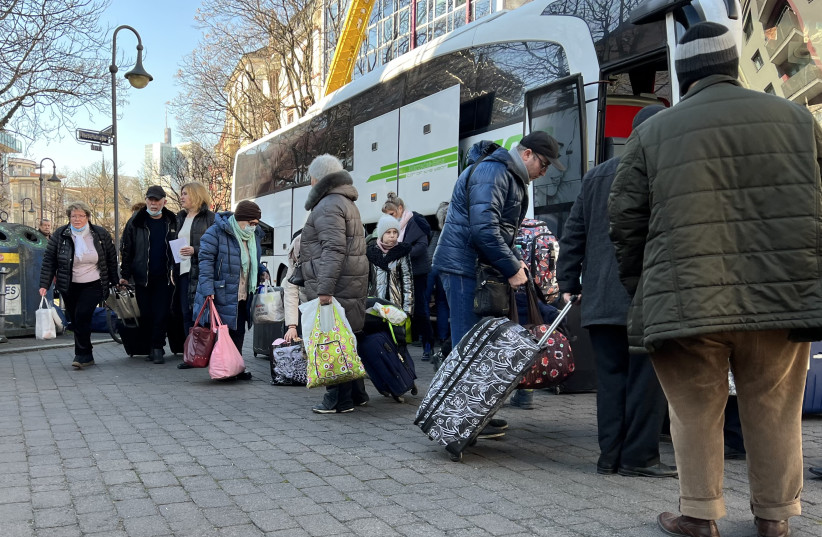Thousands of Jewish-Ukrainian refugees have immigrated, at least temporarily, to Germany, a country once the Jewish nation’s worst enemy, nowadays a country that is interested in attracting as many Jews as possible.
According to Israeli demographer Prof. Segio Della Pergola, there are 118,00 Jews in Germany, but if we consider those who are entitled to move to Israel based on the Law of Return, there are probably close to 200,000 Jews across Germany.
Germany’s Jewish community was small until the beginning of the 1990’s when tens of thousands of Jews from the FSU were offered unique social status and aid. Since about 90% of the German Jewish community consists of immigrants from the FSU, “we have to consider that 45% of the community in Germany has family in Ukraine” Aron Schuster, Director of the Central Welfare Office of Jews in Germany (ZWST) told The Jerusalem Post on Wednesday. “
Schuster added that “the fact that we have a big number of people of Ukrainian origin within our communities underlines why the war is so close to us and to our community.”
The ZWST partnered with an organization called IsrAID Germany and together they helped some 600 Ukrainian Jews to reach Germany.

“We founded IsrAID Germany in response to the refugee crisis from Syria and Afghanistan. None of us thought that we would actually have to also help Jews who would become refugees overnight,” Schuster said.
“We have helped a Jewish community to evacuate from Ukraine to Romania. In the past two weeks, we have arranged relief transportations...”
We’ve realized that many Ukrainians considered going to Moldova’s capital Kishinev (Chisinau). The thing is, Moldova is the poorest country in Europe. Therefore, about three weeks ago, we decided to evacuate Jews to Germany, to the city of Frankfurt. On a daily basis, we have been sending buses from Moldova to Germany. It’s a very long journey, it takes about 36 hours. It’s very challenging. Because you have to cross several borders. We are bringing all those people to Frankfurt and they are taken care of by our social workers.”
“What is very unique for the whole Jewish community and also for organizations across Europe is that we have Russian and Ukrainian speaking social workers and volunteers. This is something very unique, something that the non-Jewish welfare organizations in Germany don’t have – not even the Red Cross.
“They don’t have as many Russian–speaking people as we have. So this is actually a unique selling point that people are coming over, taking and being taken care of.”
Schuster explained that many of these refugees have asked for assistance with housing. “We try to find places where people can stay” he said, “We have more than 100 Jewish communities spread across the country. And almost every community is very very active in hosting.”
How many people have arrived from Ukraine to German Jewish communities?
“It’s very difficult to say because a lot of people are coming on their own. They have relatives in Germany. We never see them because they are directly going to their relatives. These are refugees that aren’t monitored by us. There are other Jewish organizations bringing buses of Jews to Germany such as Chabad.”
Schuster said that 12 full buses of about 500 Ukrainian Jews have already arrived in Germany.
Who is funding these activities?
“Largely German humanitarian organizations but the buses that we are bringing from Moldova are funded by private donors through the Jewish community.
“We are expecting up to 10,000 Jewish refugees in Germany in the near future but it’s hard to say.
Schuster said that the majority of refugees arriving in Germany “have a special need for protection, because we see mainly mothers coming with young children, without their husbands. We see a lot of elderly people, some of them suffering from dementia. We also see many Holocaust survivors coming over here that need help.
What is needed is to bring all those people with special needs quite fast into our regular schools, kindergartens, and make sure they have stable homes. It’s a challenge.”
The ZWST is in the midst of a fund-raising campaign in order to absorb these Jewish refugees in a better way. “We are still in negotiations with big foundations and are raising money online. Our federal government is now also offering additional support for the welfare organizations in Germany, such as us.” Schuster hopes to raise a few hundred thousand euros.
Even though the German aid and support for refugees are considered to be one of the most gracious and extensive, Jews who wish to become German citizens have a unique status and receive a lot more: “Jewish refugees receive what other refugees receive but the main difference is that it isn’t just for three years, but actually on-going. They can receive housing, a monthly stipend, health insurance and other types of support.”
To be recognized by the German government as a Jewish refugee you have to show the same papers you would need in order to qualify for Israeli citizenship: only those who are entitled to the Law of Return (at least one Jewish grandparent) can become a German citizen and receive special treatment and status.”
Schuster is happy to assist Jewish refugees in Germany but said that “most of the refugees we’ve met say they want to move to Israel, we think Germany is the second most popular country after that.”
